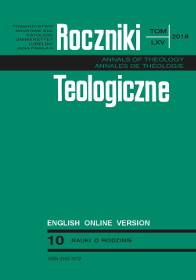Family Ecology and Environmental Protection in the Teachings of the Catholic Church
Abstract
Within a lifetime, man creates a natural family environment and must care to protect it. A manifestation of this ecological activity in the family is the ability to experience love, to learn respect and live together with other people. The quality of these community relationships and the lifestyle that people experience in the family shape pro-ecological attitudes. Cooperating with the Creator, man cares for the protection of human life. Therefore, he undertakes actions aimed at eliminating degrading and destructive processes, and strives to live in harmony with the natural environment. In fact, man is an inseparable element of the environment, and therefore caring for his survival is most essential. Man is also called to rule the earth through work and development, while at the same time becoming spiritually mature and more responsible, especially towards the weak and needy.
References
Benedict XVI. Encyclical Caritas in veritate (29.07.2009).
Dołęga, Józef M. “Ekofilozofia i jej otulina.” In Rozmaitości ekofilozofii, [Eco-Philosophy and its Buffer Zone, in: The Diviersity of Eco-philosophy], edited by Antoni Skowroński, 43–67. Olecko: Wydawnictwo Wszechnicy Mazurskiej Acta Universitatis Masuriensis, 2006.
Francis. Encyclical Laudato si (June 24, 2015).
Francis. Encyclical Amoris laetitia (March 19, 2016).
John Paul II. Encyclical Redemptor hominis (March 4, 1979).
John Paul II. Encyclical Laborem exercens (September 14, 1981).
John Paul II. Encyclical Familiaris consortio (November 22, 1981).
John Paul II. Encyclical Centesimus annus (May 1, 1991).
John Paul II. Letter to Families (February 2, 1994).
John Paul II. Encyclical Evangelium vitae (March 25, 1995).
Konstańczak, Stefan. “Kontrowersje wokół ekologii głębokiej.” In Rozmaitości ekofilozofii, [Controversies Over Deep Ecology, in: The Diviersity of Eco-Philosophy], edited by Antoni Skowroński, 121–140. Olecko: Wydawnictwo Wszechnicy Mazurskiej Acta Universitatis Masuriensis, 2006.
“Konsumizm” [Consumerism]. In https://sjp.pwn.pl/sjp/;2473455 (14.02.2018).
Latawiec, Anna. “Rodzina ekologiczna—co to jest?” In Ekologia rodziny ludzkiej [What Is the Ecological Family? in: Ecology of the Human Family], edited by Józef M. Dołęga, Jacek W. Czartoszewski, 43–57. Olecko: Wydawnictwo Wszechnicy Mazurskiej Acta Universitatis Masuriensis, 2000.
Najder-Stefaniak, Krystyna. “Twórcze działanie w paradygmacie ekologicznym.” In Rozmaitości ekofilozofii [Creative Action in the Ecological Paradigm, in: The Diviersity of Eco-Philosophy], edited by Antoni Skowroński, 201–220. Olecko: Wydawnictwo Wszechnicy Mazurskiej Acta Universitatis Masuriensis, 2006.
“Ochrona środowiska” [Environmental Protection], in http://www.ekologia.pl/wiedza/slowniki/ leksykon-ekologii-i-ochrony-srodowiska/ochrona-srodowiska (30.04.2018).
Papuziński, Andrzej. “Historyczne a współczesne motywy i cele ochrony przyrody.” In Rozmaitości ekofilozofii [Historical and contemporary motifs and goals of nature conservation, in: The variety of ecophilosophy], edited by Antoni Skowroński, 29–41. Olecko: Wydawnictwo Wszechnicy Mazurskiej Acta Universitatis Masuriensis, 2006.
Paul VI. Encyclical Populorum progressio (March 26, 1967).
Woronowski, Franciszek. “Zagadnienie proekologicznego wychowania w rodzinie.” In Ekologia rodziny ludzkiej [The Problem of Pro-Environmental Education in the Family, in: Ecology of the Human Family], edited by Józef M. Dołęga, Jacek W. Czartoszewski, 229–244. Olecko: Wydawnictwo Wszechnicy Mazurskiej Acta Universitatis Masuriensis, 2000.
Copyright (c) 2018 Roczniki Teologiczne

This work is licensed under a Creative Commons Attribution-NonCommercial-NoDerivatives 4.0 International License.





